#smolensk 1812
Explore tagged Tumblr posts
Text
Letter from Laure Junot to her husband (1812)
This is for @impetuous-impulse and @snowv88: As promised, here’s the letter Laure Junot wrote to her husband in September 1812, when Junot was with the Grande Armée in Russia. It’s taken from the book "Lettres interceptées par les Russes", edited by Frédéric Masson (and of which I only own one of those Indian "reprints" that come down to a really bad scan and that I had rightfully be warned of before I bought it 😋. However, these pages are perfectly legible.)
For context: While the publication contains letters that normally did not reach their destination, as they were intercepted during the second half of the Russian campaign, this missive actually had been written during the first months of the invasion and had gotten to Junot safely. However, in his answer, Junot sent it back to Laure, and this answer then fell into the hands of the Russians. (I do not know what they were thinking. Because it’s rather private, and not pretty.)
Laure Junot, at the time when she wrote this letter, happened to be at a spa, at the same time as several other ladies of the court, off-duty empress Joséphine, Julie more-or-less-queen of Spain, Pauline Borghese and the crown princess of Sweden, Julie’s sister Désirée.
The Duchess L. of Abrantès to Junot, Duke of Abrantès. Aix [en Savoie], 7 September 1812 Your last letter caused me to feel both pain and pity. It comes from a fool, and from a fool all the more guilty for being so, as it depends on him to recover his reason and as he refuses to do so as stubbornly as if it meant his eternal misfortune. People dominated by an unfortunate passion are, in the beginning, like sick people who do not want to submit to the vigorous treatment that would cure them. And you want me to feel sorry for you! You want me to pity you! But do you deserve it? Yes, perhaps, but of this pity stripped of all esteem, for you are not the one to whom I promised to offer mine along with all my friendship as the prize for his noble efforts to deserve the name of man, by removing from his heart a feeling that he knows can never be happy. In this respect, you know my way of thinking. It is invariable, and nothing can change it. For many months I have spoken in the same terms to you, and I always will, because it is the language of both my heart and my reason. Perhaps it seems too harsh to you and you find me too frank. A more flirtatious person would no doubt be less so, but is it not better for me to refuse you a poison that would only aggravate your wound and to apply to it a balm that should, according to my desire, remove even the scar and only leave behind of its memory that which could, in the future, spread more charm over our friendship?
Whoa. Now that's a handfull. Please don't hold back, Madame! I have no clue (but would love to speculate!) what kind of "unfortunate passion" she refers to.
For a long time I had this ambition that almost all women have, this unbridled desire to attract attention and admiration, to inspire passionate feelings, to be a kind of divinity for everything around me. I paid for all these adulations with a look or a smile that often troubled the soul of the person to whom they were addressed, without stirring mine. Well, it is with bitterness that I remember this time in my life, and it would seem criminal to me now to encourage or give rise to a feeling that I could not share.
Is this a hint at her own wrongdoings, the affair with Metternich?
I am very happy to think that you are now close to your mother and your son. Give the latter all the time you can spare from your business and the duties you are obliged to fulfil. You have, you told me, great confidence in his tutor. But could strangers ever match a father's eye? Your abilities and your wit put you in a position to watch over his studies very closely yourself. May your loving attention also be focused on his young heart and his feelings. May he one day be able to return to you all the good things he possesses. Believe me, his virtues will be much dearer to him.
This passage confuses me deeply. How can she assume Junot is with his mother and his son in September 1812, when Junot is with the Grande Armée, and the Grande Armée in Russia since June? She must have known that, right? We'll see in the postscript that the ladies were informed of what was going on at the front. Also, the need she feels to interest Junot in his own child is so sad.
I'm leaving for Geneva the day after tomorrow, no matter how much the princesses insist that I stay. I haven't seen my children for three months now, and the need to be closer to them is becoming more pressing every day. I promised to go to Changrenon. I have to spend two days there, and from there I'll go straight to Paris, where I'll be very happy to see and embrace my children, the joy and glory of my life! Ah, when I look back on such moments, I no longer say that it is deprived of any happy future!
Which apparently otherwise she had said. - Also, as she says she will go to Paris to see her children, does that not imply that the son (who was five at the time, according to a footnote) was also there? Does that mean that in the passage above she supposed Junot to be in Paris as well? For that matter, was Junot's mother in Paris, or did she live elsewhere?
I hope that the first letter I receive from you will be good and reasonable, just as I want it to be. Many people take great pride in never changing their feelings. Do the opposite and put your pride in driving away from you those who now dominate you. It is only through weakness, believe me, that we retain an unreasonable inclination, and the word consistency is profaned when applied to madness. Farewell, believe in my sincere friendship; nothing can diminish it, and one thing can increase it greatly: the certainty of being able to give it to you without fear.
This sounds more like a mother trying to reign in an adolescent. The use of the word "crainte" is also interesting. What precisely does she fear?
You ask me about my health. In truth, I don't know what to tell you, as I am still too ill to go and distress my friends by telling them about my sufferings. I'm still coughing up blood, and in the last six days I've had three new bouts of vomiting. There you have my bulletin. P.S.: I am reopening my letter to tell you that I am no longer going to Geneva. Yesterday, after writing my letter, I received the bulletin of the 25th [August, of the Grande Armée in Russia, mentioning her husband]. You have probably read it, and you know me well enough to be convinced that this is not the moment I would choose for a pleasure trip. I'm also in a lot of pain; two hours ago, on my way back to the Empress's, I vomited so much blood that it could only be stopped by putting ice on my chest, so now I'm in so much pain that I can't breathe.
Does she try to imply that the army bulletin they received made her feel worse? I think it's the one mentioning Junot not quite being up to the job.
Also interesting: She adresses her husband by the formal "vous" throughout the letter. Which I believe was slowly going out of use but still not unusual in France, especially between spouses of high nobility. Still, this letter makes me feel as if Laure and her Andoche at this point already lived seperate lives. It sounds like one you would write to a husband you had recently divorced.
#napoleon's court#napoleon's generals#laure junot#jean andoche junot#russian campaign#russia 1812#smolensk 1812
38 notes
·
View notes
Text
This is something I would love to see in a painting! It’s a side of Murat too often overlooked because everyone is preoccupied with his appearance.
As to Belliard, he gets mentioned a lot in Joseph’s correspondence as well. He was gouvernor of Madrid for some time. His record with Joseph is mixed, too, it seems, though a lot better than Soult’s 😁. At some point Joseph wanted to replace him with a Spaniard, but Napoleon intervened and demanded Belliard be put back in place. And at another, after Belliard had learned that the officers in Soult’s armée du Midi were granted a food allowance, he demanded the same thing for the officers in the army under Joseph’s command. (Though in truth, this could rather have been an attempt by Joseph to denounce Soult for having exceeded his authority by granting these allowances.)
I’ve also checked Eugène’s correspondence. He writes a letter to Auguste from Smolensk, detailing that they had minus 17 to 18 degrees. He does not say where he was staying in Smolensk, though in all likelihood he was far better off than poor Griois. Eugène did still have one carriage at this point, because he mentions that he was transporting his secretary Méjan in it. Plus, he was still suffering from a swollen leg he had strained too much.
Fun fact: He also receives at least three orders from Berthier to finally come and pick up the hand mills accorded to 4th corps (which were of course useless baggage by then, as there was no grain).
Excerpt:
Belliard, still suffering from the wound he’d received at Mojaïsk, was lying down on a bad pallet, on which Murat occupied a part, sitting at his feet. The picture was not without interest. A king, because after all he was one and was recognized as such, keeping company with one of his wounded generals and appearing as a friend caring for another friend, it is a rare thing, and I confess I was touched by it.
42 notes
·
View notes
Text
The life of Jean-Andoche Junot
Since I have exceeded the limit of links I can put in the history post catalogue in my pinned post, I'm making a separate post to catalogue everything I've translated and uploaded on Junot!
I will put a flower next to the most important posts 🌷
general information:
Junot's head injuries 🌷
was Junot bisexual?
my refutation of the theory that Junot had syphilis
British caricatures of Junot
early life:
Junot's birth and baptism 🌸
Junot's ancestry
schoolboy memories 🌸
Junot's older brother
Junot in 1789 🌸
relationship with Napoleon:
a note from Napoleon to Junot, 1794
Junot on his attachment to Napoleon 🌹
'Orestes and Pylades'
an anecdote on young Napoleon, Junot and Marmont 🌹
Napoleon and Junot in Italy
Napoleon insults Junot's scars 🌹
a letter from Junot to Napoleon, 1812 🌹
a letter from Junot to Napoleon on his denouncement + Laure's letter on the denouncement 🌹
military and diplomatic career:
Junot's heroic deed in 1794
Junot gets injured at the battle of Lonato, 1796 🌺
Junot meets the Directory
Junot's friend gets assassinated
The battle of Nazareth
a poem on the battle of Nazareth
Junot's helps an Englishman to evade arrest 🌺
Junot as ambassador to Lisbon
Austerlitz 🌺
Napoleon and Wellington's opinions on Junot's actions at the Convention of Cintra 🌺
Junot's 1811 facial injury 🌺
a letter from Wellington to Junot 🌺
an Englishman's opinion of Junot
Junot's defence of his actions at Smolensk 🌺
personal life and interests:
Junot's art collection 🌸
Junot's rare books collection
Junot's talent with a pistol
romance with an Englishwoman 🌸
Junot, Josephine and Hippolyte Charles in Italy
Junot's ghostly encounter
a murder attempt on Junot
Junot stands up for his friend 🌸
Junot's love affair with Xraxarane 🌸
Junot's duel in Egypt 🌸
Junot and Laure's wedding 🌸
an anecdote on pregnancy and pineapple
Junot's friendship with Hippolyte Charles
a letter from Junot to Hippolyte Charles 🌸
Junot's affair with "Mlle V"
Junot takes an acting class 🌸
Junot, Pauline and Caroline
the Chateau du Raincy
Junot's affair with Caroline 🌸
Junot’s famous handwriting
signature as Duc d'Abrantès
a luxury pocket watch
later life and death:
a letter from Junot to Laure on his hopes for a peaceful retirement 🥀
a letter from Junot to his daughter Constance, 1812 🥀
a letter from Junot to Napoleon on his denouncement + Laure's letter on the denouncement
a contemporary impression on Junot in Illyria - 'Achilles' 🥀
Illyria, Icepit, insanity 🥀
the house where Junot died
Laure’s letters on Junot’s death
Junot's original death notice
Junot's grave and funerals 🥀
137 notes
·
View notes
Text
The Battle of Borodino on 26 August 1812 by Peter von Hess
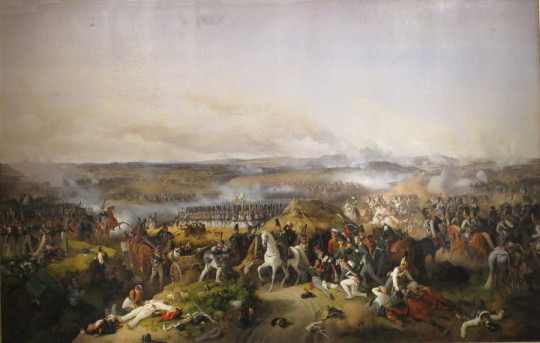
The Battle of Borodino took place near the village of Borodino on 7 September (O.S. 26 August) 1812 during Napoleon's invasion of Russia. The Grande Armée won the battle against the Imperial Russian Army, but failed to gain a decisive victory and suffered tremendous losses. Napoleon fought against General Mikhail Kutuzov, whom the Emperor Alexander I of Russia had appointed to replace Barclay de Tolly on 29 August (O.S. 17 August) 1812 after the Battle of Smolensk. After the Battle of Borodino, Napoleon remained on the battlefield with his army; the Imperial Russian forces retreated in an orderly fashion southwards. Because the Imperial Russian army had severely weakened the Grande Armée, they allowed the French occupation of Moscow, using the city as bait to trap Napoleon and his men. The failure of the Grande Armée to completely destroy the Imperial Russian army, in particular Napoleon's reluctance to deploy his Imperial Guard, has been widely criticised by historians as a huge blunder, as it allowed the Imperial Russian army to continue its retreat into territory increasingly hostile to the French. Approximately a quarter of a million soldiers were involved in the battle, and it was the bloodiest single day of the Napoleonic Wars.
Although the Battle of Borodino is classified as a victory for Napoleon since he and his men managed to capture Moscow, the fierce defense of the Imperial Russian Army devastated the Grande Armée to such an extent that it caused France and its army to become militarily impuissant. Also, the city was actually used as bait to lure and trap the French forces. When Napoleon and his men visited the city, he found that it was burnt and abandoned upon his arrival. While Napoleon was in Moscow, he sent a letter to the tsar who was residing in Saint Petersburg demanding that he surrender and accept defeat. Napoleon received no response. Whilst patiently waiting for an answer from the tsar, as soon as the cold winter and snowfall started to form, Napoleon, realizing what was happening, attempted to escape the country with his men. Seeing that they were fleeing, the Imperial Russian army launched a massive attack on the French. Attrition warfare was used by Kutuzov by burning Moscow's resources, guerrilla warfare by the Cossacks against any kind of transport and total war by the peasants against foraging. This kind of warfare weakened the French army at its most vulnerable point: logistics, as it was unable to pillage Russian land, which was insufficiently populated nor cultivated, meaning that starvation became the most dangerous enemy long before the cold joined in. The feeding of horses by supply trains was extremely difficult, as a ration for a horse weighs about ten times as much as one for a man. It was tried in vain to feed and water all the horses by foraging expeditions. Of the more than 600,000 soldiers who invaded the Russian Empire, fewer than 100,000 returned. Sources. The Battle of Borodino, from Wikipedia, the free encyclopedia
youtube
#Отечественная война 1812 года#War of 1812#Художник#Начинающий художник#famous artists#Эрмитаж#Hermitage Museum#Russian Empire#Российская империя#История России#Наполеон#Napoleon Bonaparte#Наполеоновские войны#Михаил Кутузов#Mikhail Kutuzov#Peter von Hess#theintexp#Youtube
10 notes
·
View notes
Text
Once Was All There Was: Chapter 2 - "A Remarkable Man"
It's Russia in August of 1812, and Napoleon's Grande Armeé is pushing towards Smolensk. A fateful meeting is held, but who is actually the remarkable man in this situation?
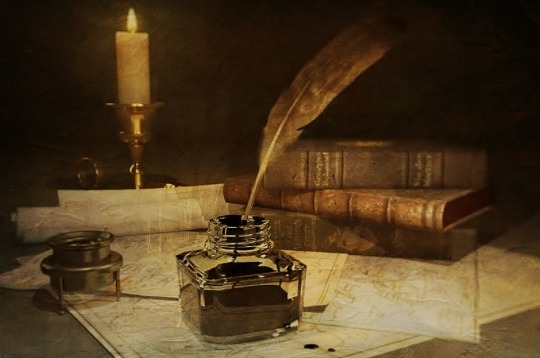
11 notes
·
View notes
Text
Les chevaux en Russie (1812) Partie 2
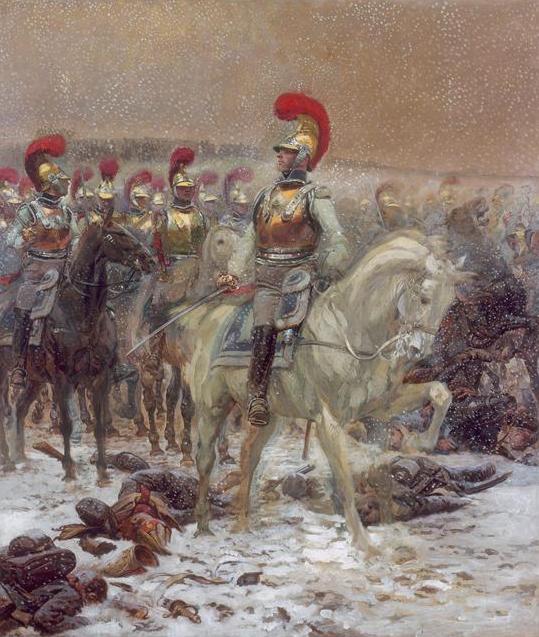
(suite partie 1)
Ça passe ou ça casse ?
La perte des dépôts de chevaux et des stocks de fourrage profitait à l'ennemi et allait compromettre la ligne opérationnelle Vilna-Minsk-Smolensk.
Napoléon fut contraint d’abandonner Smolensk, et de se replier en direction de Minsk. Il partit le 13 novembre, et l'arrière garde du maréchal Ney le 17 à minuit.
L’itinéraire Smolensk-Orcha fut un risque des plus dangereux : 120 km entre 4 et 6 jours, les marches nocturnes, une chute de la température passant de -10°C à -16-18°C, les chemins verglacés, la fatigue, le manque de vivres, puis le combat de Krasnoï.
Ces contraintes additionnées allaient décimer les chevaux : une perte de 30000 chevaux, surtout ceux originaires de France et d'Allemagne. L'attelage étant diminué, l'ordre est donné de détruire une partie des pièces de canon et des munitions, et de brûler les caissons, bagages et charrettes inutiles.
L’armée de repli devint temporairement quasi aveugle les éclaireurs à cheval se limitant à 2 km delà des troupes.
Ça passe ! "Hourra !"
Mais malgré cette semaine noire, le passage du fleuve Borysthène s'effectua.
Il n'y avait pas d'ordre de bataille, à ce moment, sur l'axe Smolensk-Orcha. Il n'y a qu'un combat sur Krasnoï pour la sauvegarde de la ligne opérationnelle.
Les corps d'armée sous le commandement de Napoléon étaient en mouvement et espacés de 1 à 3 jours. Les corps d'armée russe sous commandement de Koutuzov n'avait pas les moyens de livrer bataille suite à leurs défaites de la Moscowa et à Maloiaroslavets. Les Russes n'essaieront que de suivre, attaqueront uniquement les unités vulnérables et les trainards.
L'avant-garde (VIIIe corps) de Junot, le Ve corps (polonais) de Poniatowski, la Garde, la cavalerie Murat, le IVe corps d'Eugène, et le Ier corps de Davout ont su protéger leur ligne opérationnelle, ont repoussé les quelques attaques de l'avant garde russe, ont pu passer le fleuve Borysthène à l'Ouest, et rejoindre Orcha en sécurité.
Ne restait que le IIIe corps de Ney, formant l'arrière-garde, isolé en position vulnérable à l'Est de Krasnoï. Il allait subir les attaques et de lourdes pertes des avant-gardes russes en supériorité numérique. De là, suit un épisode d'aventures où seuls les audacieux et braves survivent. Ney et les rescapés réussirent à esquiver en passant sur l'autre rive Nord du Borysthène. Les marches intensives de nuit avaient finalement permis de distancer l'armée de Kutuzov de 3 jours.
Entre temps, la division Dombrowski laissa la ville de Minsk aux mains du corps russe Tchitchagov, ce qui coupa la ligne opérationnelle entre Vilna-Borissof-Orcha. Dombrowski fut contraint de partir sur Borisof pour rejoindre Napoléon.
Les 19-20 novembre, à Orcha, Napoléon réorganisa les corps d'armée I, III, IV, V et VIII.
Le 22 novembre, à Tolotchine, ils trouvèrent de la farine considérable et une grande quantité d'eau de vie dans les magasins. Les soldats et les chevaux ont pu se remettre en état.
Les IIe corps d'Oudinot, IXe corps de Victor et la division Dombrowski allaient se joindre aux cinq corps de Napoléon, et allaient apporter une bonne quantité de chevaux...
Arrivé le 23 novembre à Bobr, Napoléon réorganisa, une nouvelle fois, la cavalerie : on brûla la moitié des charrettes, et 200 chevaux allèrent compléter le parc d'artillerie.
Le 24 novembre, le IIe corps d’Oudinot fit 2000 prisonniers au corps d'armée russe de Tchitchagov, et récupéra 6 pièces de canon, 500 voitures de bagages, et un nombre non négligeable de chevaux.
Les manuscrits du secrétaire particulier de l'Empereur indiquent : "une file d'artillerie de 250 bouches à feu, leurs approvisionnements, 300 voitures qui passent tranquillement la rivière Bérézina le 26 novembre. Sans compter les passages du 27 et 28 novembre, nous serions impressionnés du nombre de chevaux de traits présents…"
Et les chevaux de selle furent, semble-t-il, assez nombreux, les 28-29 novembre, pour culbuter et achever les avants des corps russes de Tchitchagov et de Wittgenstein, sur la rive droite, et rive gauche de la Bérézina.
Bataille de la Bérézina, victoire française qui permettra de sécuriser la retraite et de distancer de plusieurs jours l'armée russe.
(Txt LB)
5 notes
·
View notes
Text
Events 9.11 (before 1840)
9 – The Battle of the Teutoburg Forest ends: The Roman Empire suffers the greatest defeat of its history and the Rhine is established as the border between the Empire and the so-called barbarians for the next four hundred years. 1185 – Isaac II Angelos kills Stephen Hagiochristophorites and then appeals to the people, resulting in the revolt that deposes Andronikos I Komnenos and places Isaac on the throne of the Byzantine Empire. 1297 – Battle of Stirling Bridge: Scots jointly led by William Wallace and Andrew Moray defeat the English. 1390 – Lithuanian Civil War (1389–92): The Teutonic Knights begin a five-week siege of Vilnius. 1541 – Santiago, Chile, is attacked by indigenous warriors, led by Michimalonco, to free eight indigenous chiefs held captive by the Spaniards. 1565 – Ottoman forces retreat from Malta ending the Great Siege of Malta. 1609 – Henry Hudson arrives on Manhattan Island and meets the indigenous people living there. 1649 – Siege of Drogheda ends: Oliver Cromwell's Parliamentarian troops take the town and execute its garrison. 1683 – Battle of Vienna: Coalition forces, including the famous winged Hussars, led by Polish King John III Sobieski lift the siege laid by Ottoman forces. 1697 – Battle of Zenta: a major engagement in the Great Turkish War (1683–1699) and one of the most decisive defeats in Ottoman history. 1708 – Charles XII of Sweden stops his march to conquer Moscow outside Smolensk, marking the turning point in the Great Northern War. The army is defeated nine months later in the Battle of Poltava, and the Swedish Empire ceases to be a major power. 1709 – Battle of Malplaquet: Great Britain, Netherlands, and Austria fight against France. 1714 – Siege of Barcelona: Barcelona, capital city of the Principality of Catalonia, surrenders to Spanish and French Bourbon armies in the War of the Spanish Succession. 1758 – Battle of Saint Cast: France repels British invasion during the Seven Years' War. 1775 – Benedict Arnold's expedition to Quebec leaves Cambridge, Massachusetts. 1776 – British–American peace conference on Staten Island fails to stop nascent American Revolutionary War. 1777 – American Revolutionary War: Battle of Brandywine: The British celebrate a major victory in Chester County, Pennsylvania. 1780 – American Revolutionary War: Sugarloaf massacre: A small detachment of militia from Northampton County, Pennsylvania, are attacked by Native Americans and Loyalists near Little Nescopeck Creek. 1786 – The beginning of the Annapolis Convention. 1789 – Alexander Hamilton is appointed the first United States Secretary of the Treasury. 1792 – The Hope Diamond is stolen along with other French crown jewels when six men break into the house where they are stored. 1800 – The Maltese National Congress Battalions are disbanded by British Civil Commissioner Alexander Ball. 1802 – France annexes the Kingdom of Piedmont. 1803 – The Battle of Delhi, during the Second Anglo-Maratha War, between British troops under General Lake, and Marathas of Scindia's army under General Louis Bourquin ends in a British victory. 1813 – War of 1812: British troops arrive in Mount Vernon and prepare to march to and invade Washington, D.C. 1814 – War of 1812: The climax of the Battle of Plattsburgh, a major United States victory in the war. 1826 – Captain William Morgan, an ex-freemason is arrested in Batavia, New York for debt after declaring that he would publish The Mysteries of Free Masonry, a book against Freemasonry. This sets into motion the events that led to his mysterious disappearance. 1829 – An expedition led by Isidro Barradas at Tampico, sent by the Spanish crown to retake Mexico, surrenders at the Battle of Tampico, marking the effective end of Spain's resistance to Mexico's campaign for independence. 1830 – Anti-Masonic Party convention; one of the first American political party conventions. 1836 – The Riograndense Republic is proclaimed by rebels after defeating Empire of Brazil's troops in the Battle of Seival, during the Ragamuffin War.
0 notes
Text
The Battle of Borodino took place near the village of Borodino on 7 September [O.S. 26 August] 1812 during Napoleon's invasion of Russia. The Grande Armée won the battle against the Imperial Russian Army, but failed to gain a decisive victory and suffered tremendous losses. Napoleon fought against General Mikhail Kutuzov, whom the Emperor Alexander I of Russia had appointed to replace Barclay de Tolly on 29 August [O.S. 17 August] 1812 after the Battle of Smolensk. After the Battle of Borodino, Napoleon remained on the battlefield with his army; the Imperial Russian forces retreated in an orderly fashion southwards. Because the Imperial Russian army had severely weakened the Grande Armée, they allowed the French occupation of Moscow, using the city as bait to trap Napoleon and his men. The failure of the Grande Armée to completely destroy the Imperial Russian army, in particular Napoleon's reluctance to deploy his Imperial Guard, has been widely criticised by historians as a huge blunder, as it allowed the Imperial Russian army to continue its retreat into territory increasingly hostile to the French. Approximately a quarter of a million soldiers were involved in the battle, and it was the bloodiest single day of the Napoleonic Wars.
Louis-François, Baron Lejeune (3 February 1775 in Strasbourg – 29 February 1848) was a French general, painter, and lithographer. His memoirs have frequently been republished and his name is engraved on the Arc de Triomphe.
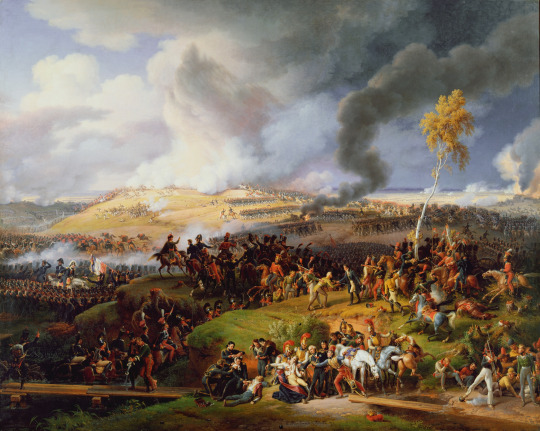
Battle of Borodino - Battle of Moscow, 7th September 1812
by Louis-François Lejeune
51 notes
·
View notes
Text
Prince Poniatowski and Napoleon during the battle of Smolensk
On occasion of this battle’s anniversary let me show a couple of images depicting emperor Napoleon and prince Józef Poniatowski:
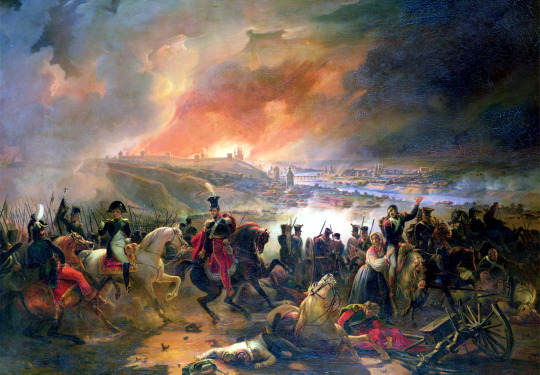
Jean-Charles Langlois, The Battle of Smolensk, 17th August 1812
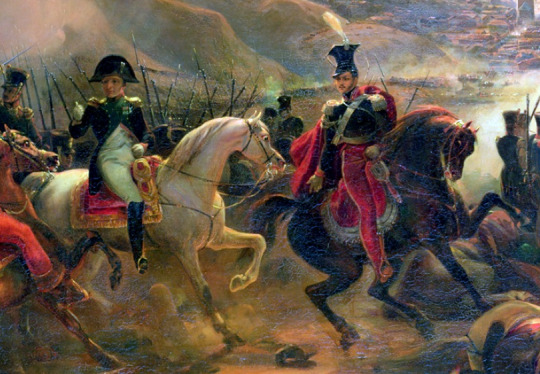
A close-up from the previous image, with Napoleon and prince Józef
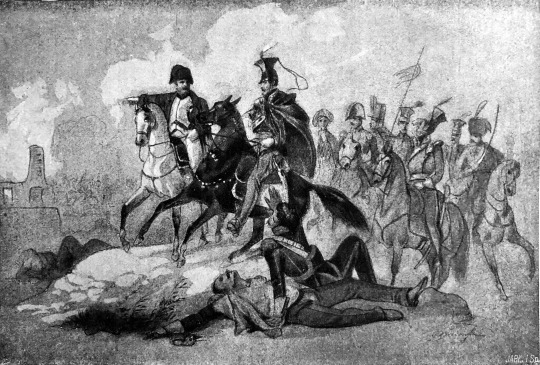
Tadeusz Brodowski, Napoleon and Prince Józef during the battle of Smolensk
The Battle of Smolensk was the first major battle of Napoleon’s Russian campaign, in 1812. It took place on 16–18 August, ending as tactical victory of the Frenchmen (whereas Russian had to abandon the city). And it were the Polish troops, under command of prince Józef, who were the first units of Grand Armée to enter Smolensk.
#józef poniatowski#poniatowski and napoleon#napoleon#1812 campaign#smolensk#jean charles langlois#tadeusz brodowski
38 notes
·
View notes
Text
A letter from Junot to his private secretary, during the Russian campaign
This is the one letter from the little series of intercepted letters during the Russian campaign, involving Laure, Calo Lallemand and Junot, that I had not translated yet. It's from the same batch, and dated from Mojaisk, where Junot at the time stayed as gouvernor.
For context: This is over a month after the Battle of Borodino, and almost two months after the Battle of Smolensk that had caused Junot's disgrace. Napoleon and the greater part of the army are still in burnt-down Moscow.
Letter 64. Junot, Duc d’Abrantès, to Cissout, his private secretary, in his palace in Paris
Mojaisk, 13 October [1812]
I received your letter of 19 September, my dear Cissout, with the August post; it is a bit thick, but what can I do? I don't understand how you have gone so long without a letter from me; a courier must have been taken. I sent you a life certificate from Gjatsk. I'm sending you another one, take your pick.
This morning I received nine parcels by Westphalian post! The gloves are worthless and look like they were made for a comedian at the Variétés. I need strong green gloves and they cost 30 francs instead of 26. You sent me some old silk stockings. I need strong new boot stockings; add some extremely fine woollen stockings. The boots, instead of being widened by two lines at the calf, have been widened by two hands, so that they might fit my thighs. Pay your compliments to Asselay, I haven't tried them yet, so don't pay for them before I tell you to. Monsieur Oubiguand does not make cologne, it is Monsieur Farina who does, and Monsieur Oubiguand has no other privilege than to make it badly. Find out all about it. Economy does not consist in buying what is the cheapest, it consists in choosing what is the best and at the right price.
Prévot is still in Moscow, and I expect him any day now; the Cossacks don't let everyone through.
You will give the small letter to the Duchess as soon as it reaches you; if the large letter reaches you in the evening, you will not give it until the following day, saying that it is another courier; similarly, if it arrives in the morning, you will give it four hours after the small letter, and you will say that there were two packages for you in the courier and that you had only been given one (office error). You will give the letter to Madame Lallemand at the same time as the small one to the Duchess, but without her seeing you, you will call her, if she is with the Duchess, on whatever pretext.
Courage, economy, finesse, and all will be well. Adieu, I am well. All yours,
Le Duc.
(Source: Lettres interceptées durant la campagne de 1812, Paris 1913, edited by Goriainow, Hennet, Martin)
On a sidenote: The Monsieur with the weird name Oubiguand seems to refer to the famous perfumer Houbigant
19 notes
·
View notes
Text
Letter from Junot to Napoleon, 3rd December 1812

"Sire, This memorable campaign ends. I began it honored with a command made to give glory and I end it with a command too far above my rank and in which I can only end up dishonoring myself… Two Bulletins have overwhelmed me ! The Bulletin which speaks of the army's march on Smolensk says that I got lost and made a wrong move. [...] I hoped by dint of marching to repair [General Tharreau's] wrongs and, in order not to lose this man, I bore the punishment of his fault, the entire 8th corps was witness to the fact, but it is only important that your majesty knows the truth."
source
29 notes
·
View notes
Note
-last words of jean la bouchard, frozen to death fifty leagues outside Smolensk, 1812
can you do any other accents?
Offensive Scottish, offensive Irish, offensive German, offensive Russian. They're all bad.
17 notes
·
View notes
Text
The Second Battle of Polotsk on 19 October 1812 by Peter von Hess

The Second Battle of Polotsk (18–20 October 1812) took place during Napoleon's invasion of Russia. In this encounter the Russians under General Peter Wittgenstein attacked and defeated a Franco-Bavarian force under Laurent Gouvion Saint-Cyr. In the aftermath of this success, the Russians took Polotsk and dismantled Napoleon's operations in Belarus. Wittgenstein's victory set the stage for the Battle of Berezina in November, in which three Russian armies converged on Napoleon from separate directions.
While advancing on Moscow, Napoleon left a contingent of French and German troops at Polotsk to guard his northern flank against Wittgenstein. The French defensive bastion at Polotsk, alternately commanded by St. Cyr and Oudinot and located about 200 miles (320 km) east of the Polish border and about 150 miles (240 km) northwest of Smolensk, was extremely important to Napoleon for several reasons.
By establishing a firm front at Polotsk, Napoleon kept Wittgenstein's command at bay. It was critical to French interests that Wittgenstein not be allowed to march south, because such an advance by the Russians would lead to Napoleon's Grande Armée, hundreds of miles to the east, being exposed to an attack in its rear while it was engaging the main Russian army near Moscow.
On the first day of combat, the Russians made seven consecutive frontal assaults on Polotsk, while Steingal's force began advancing on the French rear. The fighting at Polotsk was torrid and bloody, with the Russians losing close 8,000 to 12,000 troops, and the French suffering about 8,000 casualties. All seven Russian attacks were beaten back by the end of the day. St. Cyr could claim to have won round one in this bitter battle, but the affair was not over. Planning to renew his attack once Steingal's forces arrived, Wittgenstein maintained a heavy artillery bombardment of Polotsk, and before long much of the town was consumed by fire.
Late on the next day, 19 October, Steingal advanced to within four miles (6 km) of Polotsk, and St. Cyr realized he was threatened with encirclement. That night, knowing that their position was untenable, the French began evacuating Polotsk. Fierce house-to-house combat ensued in the town as the Russians launched their final attack.
Acting decisively to secure his battered forces' southern retreat route, St. Cyr ordered his Bavarian contingent to drive Steingal back early the following day, 20 October. This task was accomplished by the Bavarians impressively, as Steingal was compelled to retreat with heavy casualties. The French thus saved themselves from encirclement by the Russians, but still, the battle for Polotsk had been lost.
After three days of combat, St. Cyr's forces had been reduced to no more than 15,000 weary troops, in full retreat before Wittgenstein's 38,000 Russians. Two weeks later, Wittgenstein's troops captured the French supply depot at Vitebsk, inflicting a logistical disaster on Napoleon's fast collapsing Russian operation. Napoleon's northern front—the "Dwina Line"—was broken, and the consequences for Napoleon's Russian invasion were grim. Sources. The Second Battle of Polotsk, from Wikipedia, the free encyclopedia
youtube
#Отечественная война 1812 года#War of 1812#Художник#Начинающий художник#famous artists#Эрмитаж#Hermitage Museum#Russian Empire#Российская империя#История России#Наполеон#Napoleon Bonaparte#Наполеоновские войны#Михаил Кутузов#Mikhail Kutuzov#Peter von Hess#theintexp#Youtube
5 notes
·
View notes
Photo
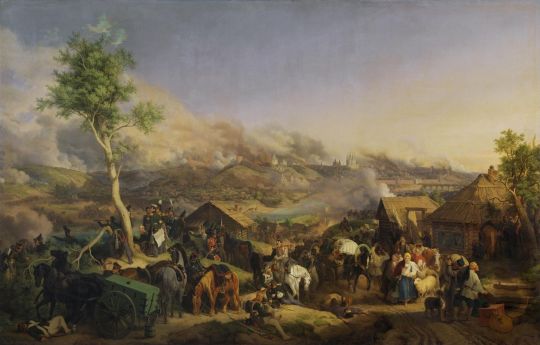
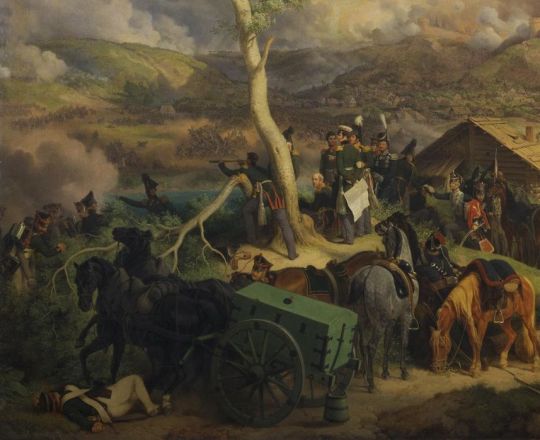
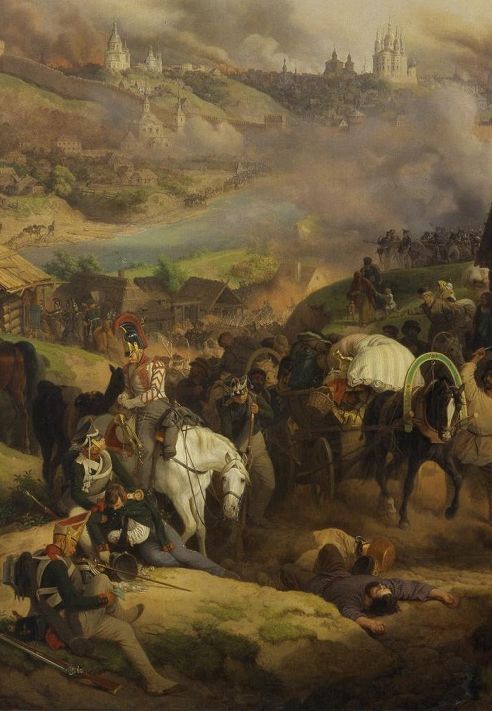
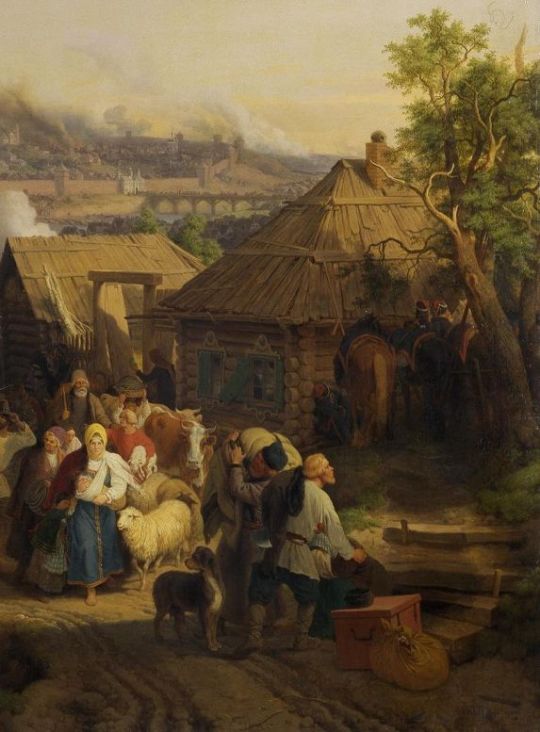
Battle of Smolensk, 17 August 1812, painted by Peter von Hess
The painting is a part of the series devoted to the great battles of the Patriotic War of 1812. This one shows a battle that took place on 5 (17) August 1812. In the foreground on the left there is Commander of the 1st Army, General Mikhail Barclay de Tolly (sitting near the tree), Chief of his Staff General Alexey Ermolov (standing nearby, with a map in his hands), Cossack Ataman of the Don Army General Matvey Platov, and General Nikolay Rayevsky. Next to them there are their adjutants and batmen. To the left of the tree, the artillery is firing at the French troops across the Dnieper. Commander of Artillery is General Alexander Kutaysov. In the foreground, in the middle and on the right, wounded Russian soldiers and civilians are leaving the city and its suburbs.
Text by the Russian State Hermitage Museum
32 notes
·
View notes
Photo

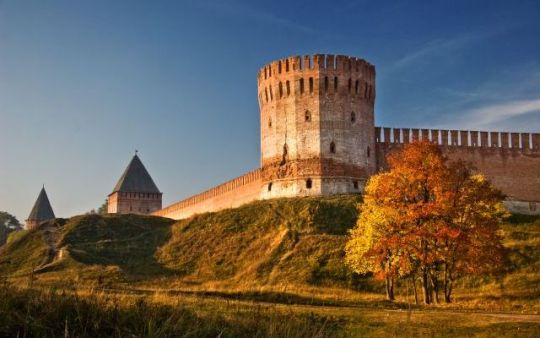
Smolensk Kremlin is a kremlin (fortification) built between 1595 and 1602, during the reign of Tsars Fyodor I Ioannovich and Boris Godunov. Most of the fortress was destroyed on November 17, 1812 by the retreating troops of Emperor Napoleon I.
Смоленская крепостная стена - городская (оборонительная) стена Смоленска, построенная между 1595 и 1602 годами во времена правления царей Федора I Иоанновича и Бориса Годунова. Большая часть стены была разрушена 17 ноября 1812 года отступающими войсками императора Наполеона I.
#history in pictures#history#russia#smolensk#smolensk kremlin#история в картинках#Смоленская крепостная стена#история#россия#смоленск#xvi#16 век#1812
24 notes
·
View notes
